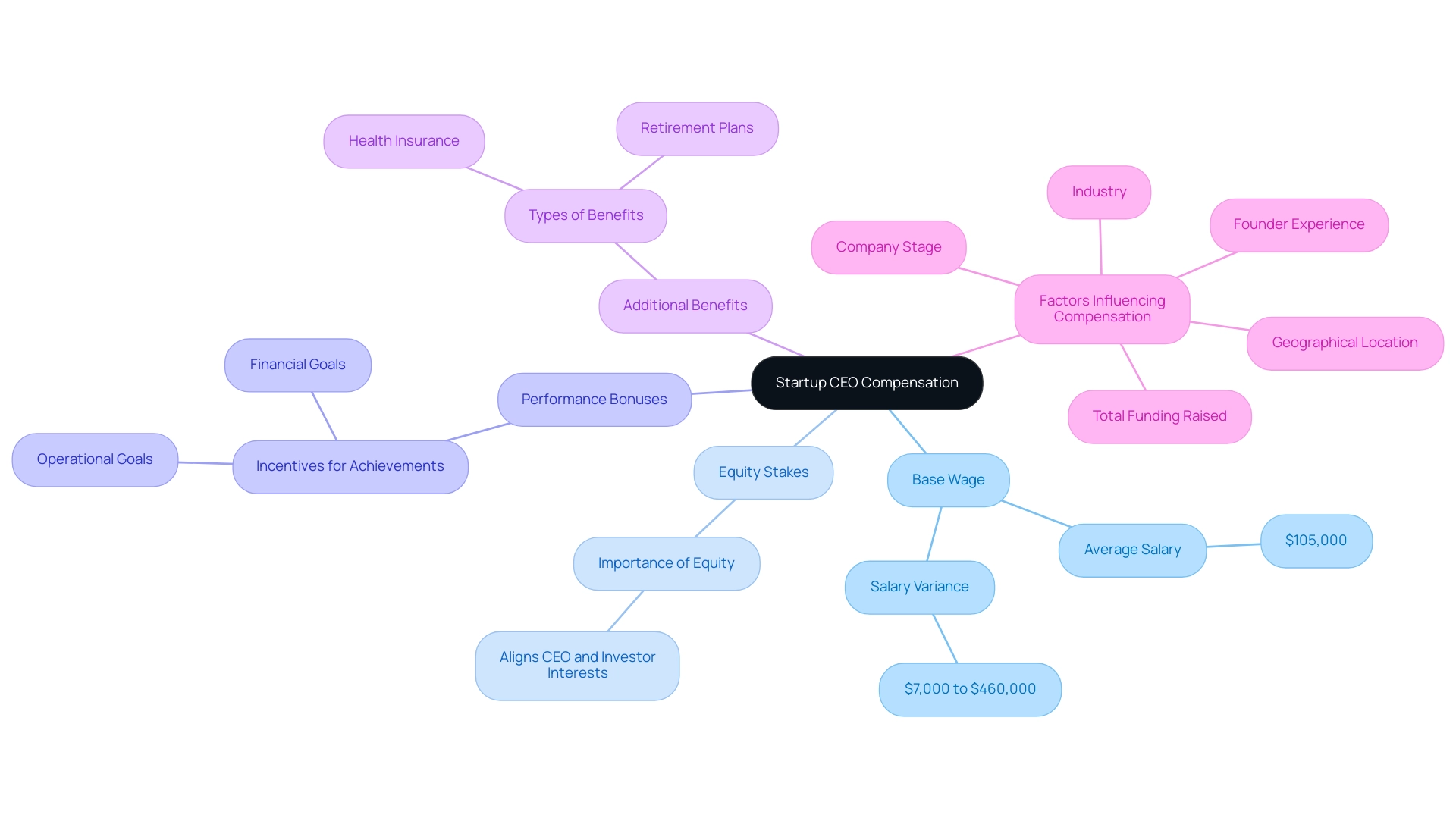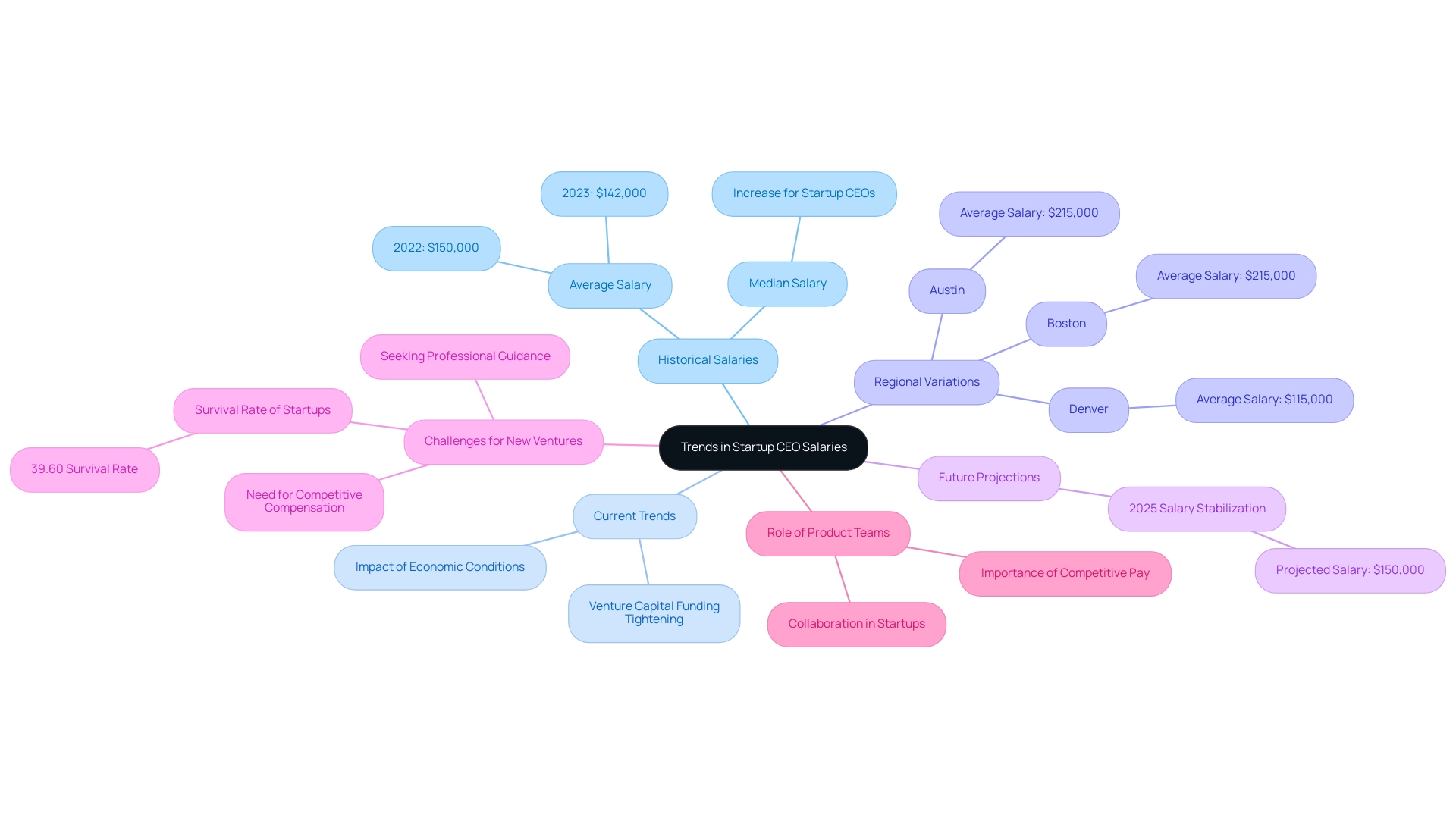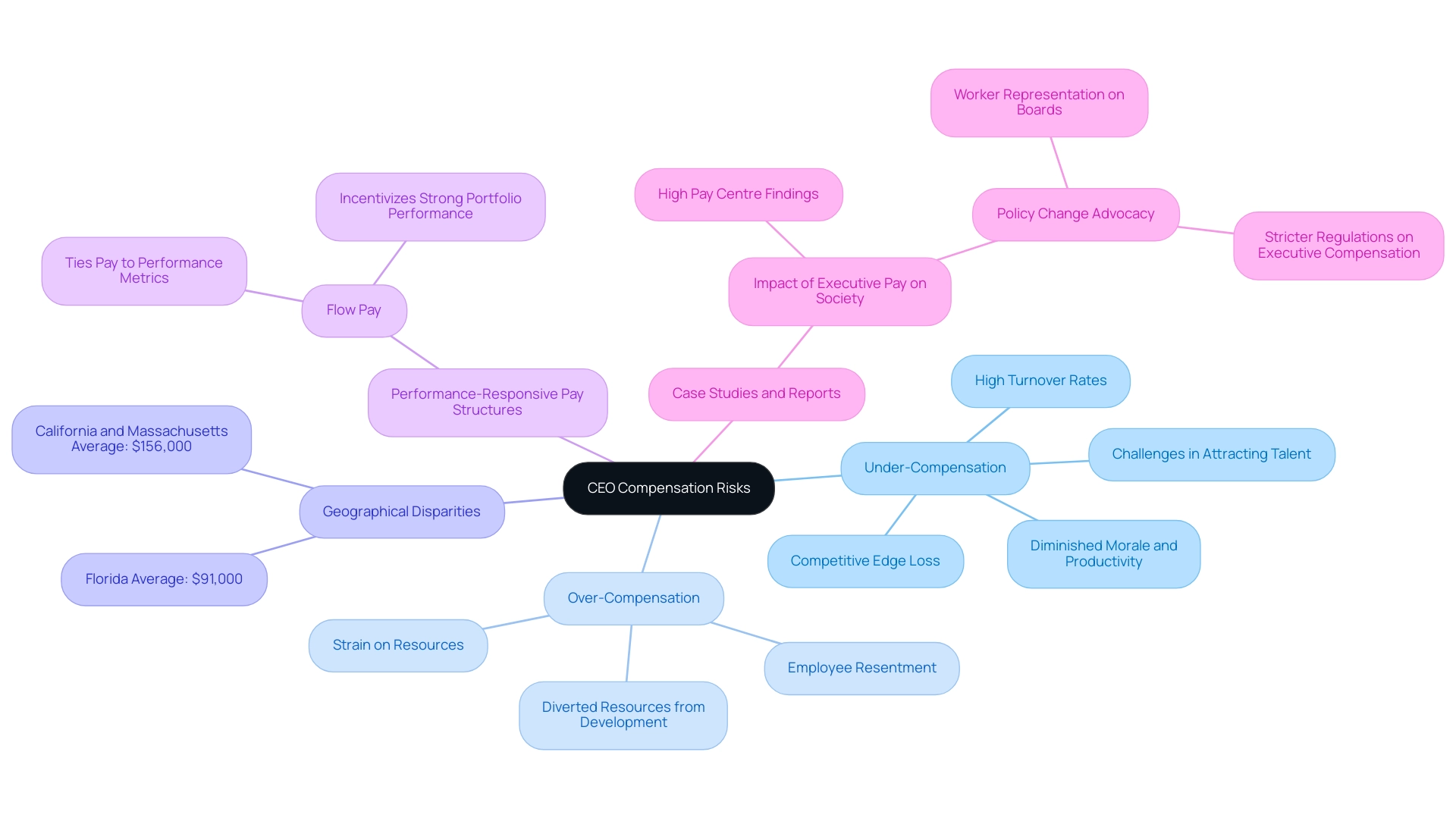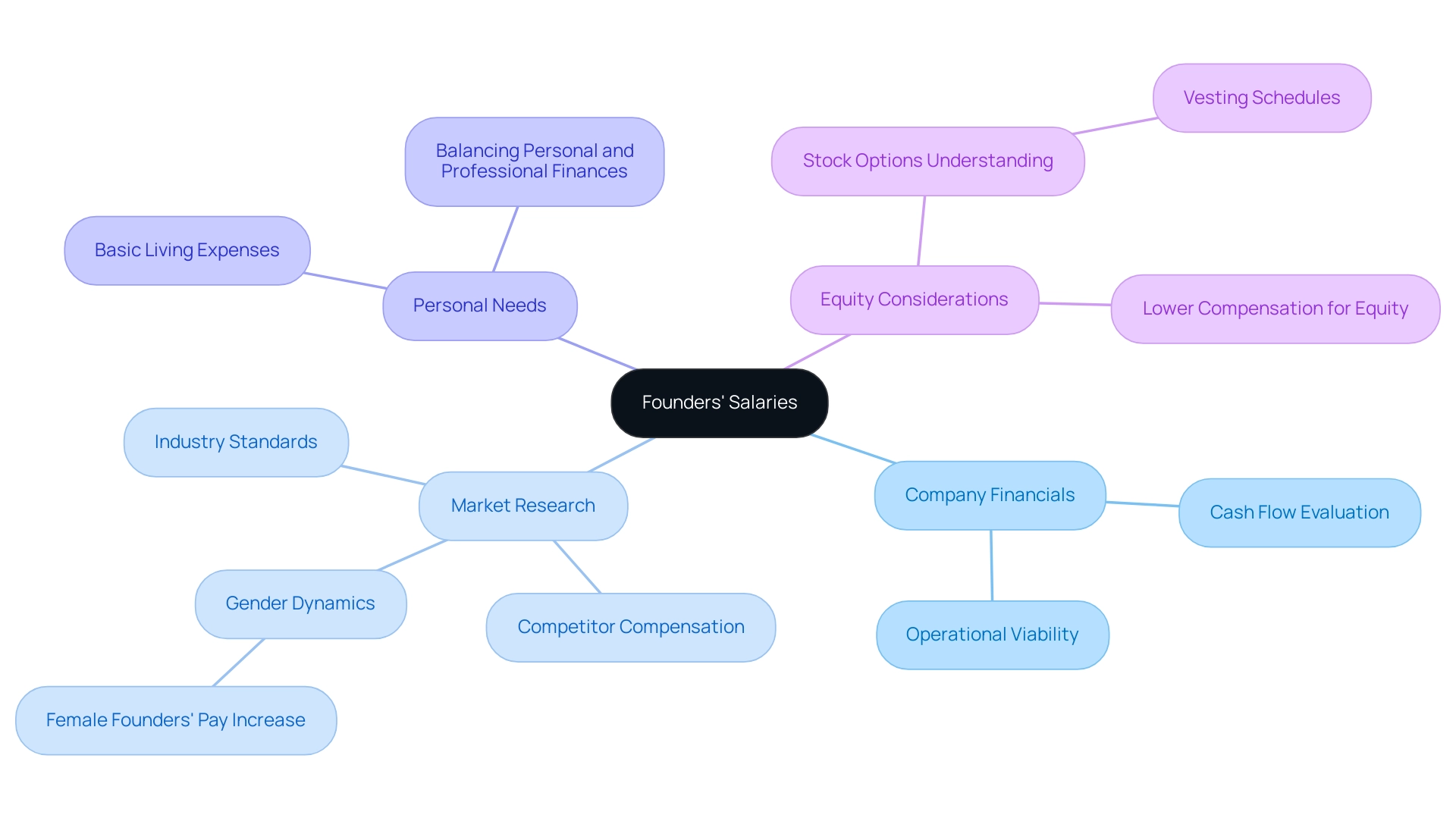Overview
In our exploration of startup CEO salaries, we recognize the myriad factors that influence these vital compensation packages. It’s essential to understand that the structures of these salaries can be quite complex, encompassing base wages, equity, and performance bonuses.
As many of our members have experienced, these salaries can vary significantly depending on the stage of the company, funding levels, industry norms, geographic location, and regulatory environments. This variability underscores a crucial point: aligning CEO pay with both market realities and company performance is not just a matter of numbers, but a necessary strategy to attract and retain top talent.
We understand that navigating these challenges can be daunting, but it’s important to foster an environment where compensation reflects the hard work and dedication of leaders in the startup community.
Introduction
In the ever-evolving landscape of startups, the compensation of CEOs emerges as a critical factor influencing both the leadership and success of these burgeoning companies. We understand that navigating this complex terrain can be overwhelming for many founders and investors.
As of 2025, the intricacies of startup CEO compensation reveal a complex interplay of:
- Base salaries
- Equity stakes
- Performance bonuses
- The growing demand for transparency and fairness
With average salaries hovering around $105,000, the variances in compensation are shaped by the company's stage, industry dynamics, geographical location, and funding levels. As many of our members have experienced, the market increasingly emphasizes equitable pay structures, making it essential to grasp these nuances.
This understanding is vital for attracting and retaining top talent in a competitive environment. This article delves into the key factors influencing CEO salaries, the trends shaping compensation packages, and the delicate balance that must be struck to ensure sustainable growth and innovation in the startup realm, fostering a sense of community and shared experience among those navigating these challenges.
Overview of Startup CEO Compensation
Navigating the complexities of startup CEO pay frameworks can be daunting for many investors. These frameworks are multifaceted, typically encompassing a base wage, equity stakes, performance bonuses, and additional benefits. As we look ahead to 2025, the average salary for startup CEOs hovers around $105,000 annually, with reported figures spanning from as low as $7,000 to as high as $460,000. This significant variance often stems from various factors, including the company's stage, the industry it operates in, geographical location, and critical elements like total funding raised and founder experience.
In today's landscape, equity rewards have taken on an increasingly vital role, often making up a substantial portion of the overall remuneration package. This shift aligns the interests of the CEO with those of investors and stakeholders, fostering a shared commitment to the long-term success of the company. Moreover, performance-based bonuses are becoming commonplace, incentivizing CEOs to achieve specific operational and financial goals.
As many of our members have experienced, there is a growing emphasis on transparency and fairness in payment practices. Industry specialists highlight the urgent need for reforms to address boardroom payment practices. Paul Nowak, General Secretary of the TUC, poignantly stated, "The government’s Employment Rights Bill will help many workers by improving pay bargaining rights and job security. We also need reforms to rein in boardroom greed, including seats for workers on executive pay committees." This sentiment reflects a broader movement towards equitable pay structures that resonate deeply within our community.
Case studies, such as those from Finance, Freedom, Fellows (fff.club), illustrate how collaborative environments can enhance our understanding of remuneration dynamics. With over 410 members from leading tech firms, fff.club fosters discussions around remuneration strategies, allowing members to share insights and best practices. These community resources and discussions are invaluable for grasping CEO remuneration structures, providing essential context for navigating these complexities.
In summary, as we approach 2025, the elements of startup CEO salaries are evolving, with a focus on aligning incentives, promoting transparency, and ensuring that pay packages reflect the realities of a competitive market. Understanding these elements is crucial for both founders and investors as they strive to attract and retain top talent in this ever-changing environment. Together, we can foster a community that values empathy, support, and informed decision-making.

Key Factors Influencing Startup CEO Salaries
Several key factors significantly influence the salaries of startup CEOs, and understanding these can help tech investors navigate the complexities of executive compensation.
-
Company Stage: The stage of a startup plays a crucial role in determining CEO compensation. Early-stage startups often provide a lower salary as they focus on growth and resource allocation. In contrast, later-stage companies that have secured substantial funding can afford to offer more competitive compensation, reflecting their increased financial stability and market presence. As many of our members have experienced, this can create a sense of uncertainty for investors looking to understand the potential return on their investment.
-
Funding: The amount of capital raised directly influences CEO salary levels. Startups that attract significant investment are often in a position to offer higher compensation packages, as they can allocate resources towards attracting top talent. This trend is particularly evident in the tech sector, where funding rounds can lead to substantial pay increases. We understand that this can be a source of concern for investors, as they seek to ensure their investments are in capable hands.
-
Industry Norms: Compensation standards vary widely across industries. Tech startups, for instance, tend to provide a greater salary compared to their counterparts in other sectors, driven by intense competition for skilled leaders and the high stakes associated with innovation and market disruption. Recognizing these norms can help investors align their expectations with industry realities.
-
Location: Geographic location is another critical factor influencing the salary of a CEO. Salaries can differ markedly between regions, especially when comparing urban centers with higher living costs to rural areas. Startups situated in technology hubs like Silicon Valley frequently offer higher salaries to attract talent, mirroring the local economic environment. As many investors have noted, understanding these regional dynamics can enhance decision-making.
-
Regulatory Environment: Recent reforms, such as those introduced by the Dodd-Frank Act, have increased transparency around CEO salaries. These regulations enable shareholders to express their views on executive remuneration, impacting salary frameworks within new ventures. This regulatory landscape promotes greater accountability and transparency, which many investors appreciate as they seek to support fair practices.
-
Market Trends: Current research indicates that less than half of UK employees are satisfied with their pay, highlighting a broader trend of salary dissatisfaction that can influence CEO salaries and hiring strategies for new businesses. As new ventures compete for talent, they must consider CEO compensation alongside overall employee satisfaction. This dissatisfaction can shape how startups design their remuneration packages, particularly for the CEO, to attract and retain top talent.
In the context of these factors, it's important to note that CEO salaries have experienced an annual growth rate of 8.5% from 1980 to 2004, indicating a long-term trend of increasing salaries in this role. Furthermore, as Akim Arhipov, founder of fff.club, states, "Financial superpowers should be accessible to everyone," underscoring the significance of fair remuneration practices.
By understanding these factors, tech investors can better evaluate the remuneration landscape for new company CEOs and make informed choices regarding their investments. Additionally, fff.club enhances the investment experience by enabling co-investing and learning from one another, which can lead to better insights into compensation practices and overall investment strategies.

Trends in Startup CEO Salaries: Past and Present
In recent years, many of us have witnessed the earnings of company leaders fluctuate significantly, reflecting the evolving nature of the tech investment landscape. As of 2023, the average salary for new company CEOs stands at approximately $142,000, a decrease from the $150,000 reported in 2022. This decline can be disheartening, as it is largely influenced by broader economic conditions, including a tightening of venture capital funding, which has inevitably impacted salary trends within the industry.
Despite this average decline, it is heartening to note that the median salary has shown slight increases, particularly for startup CEOs. This underscores the importance of offering competitive pay packages to attract and retain the exceptional talent that drives innovation and growth in our communities.
Looking ahead to 2025, projections indicate that the CEO salary for startups may stabilize around $150,000. However, certain markets, such as Austin and Boston, are expected to lead the way, with average salaries reaching $215,000 per year, while Denver's average remains at $115,000. These figures highlight the regional disparities in compensation and suggest that, although the overall trend may reflect caution in spending, specific markets continue to present promising opportunities for emerging business leaders.
It’s important to acknowledge that statistics reveal a challenging environment for new ventures, with only 39.60% of companies established in 2017-18 surviving for five years. This reality can be daunting for new entrepreneurs and their leadership teams. Expert analysis indicates that variations in startup CEO salaries are influenced by several factors, including the market demand for skilled leadership and the evolving landscape of equity rewards. As new businesses navigate these complexities, seeking guidance from financial or legal professionals becomes increasingly vital to ensure compensation packages align with industry standards and effectively attract the right talent.
Case studies illustrate these trends, particularly highlighting the role of product teams in new ventures. This emphasizes the necessity for competitive compensation to foster product innovation. By understanding these compensation trends and their implications, CEOs can better position themselves within the market, ensuring they remain competitive in attracting the essential talent needed to advance their ventures. We recognize that navigating these challenges can be overwhelming, but together we can support one another in fostering a thriving community of innovative leaders.

The Risks of Under- and Over-Compensation for Startup CEOs
Compensation that is either too low or excessively high can profoundly affect the success of a new business. We understand that under-compensation often leads to high turnover rates and challenges in attracting top talent, which can stifle innovation and growth. Conversely, over-compensation can strain company resources, create resentment among employees, and foster a culture of inequity.
As many of our members have experienced, a report from the High Pay Center highlights that the widening gap between executive pay and worker salaries can lead to disenfranchisement, potentially fueling support for extremist politics. This underscores the importance of startups carefully considering their remuneration strategies.
Striking the right balance is crucial; a well-structured remuneration package for the CEO of startup salary should not only reflect the CEO's contributions but also align with the company's financial health. Regular assessments of compensation levels against industry benchmarks are essential for maintaining this equilibrium. For example, the CEO of startup salary varies significantly by geography, with averages of $156,000 in California and Massachusetts, compared to $91,000 in Florida. Such disparities illustrate the importance of context in determining fair compensation.
Moreover, excessive CEO pay can divert resources away from critical areas such as employee development and operational efficiency. In 2025, the impact of high CEO of startup salary on company performance remains a pertinent issue, as organizations must navigate the delicate balance between rewarding leadership and ensuring sustainable growth. Expert opinions suggest that performance-responsive pay structures, like flow pay, can fairly recognize a CEO's contributions while incentivizing strong portfolio performance. Flow pay is designed to adjust remuneration based on performance metrics, ensuring that the CEO's pay is closely tied to the company's success.
Case studies reveal that under-remuneration can lead to detrimental outcomes, including diminished morale and productivity. Startups that fail to adequately compensate their CEOs, particularly concerning ceo of startup salary, may struggle to maintain a competitive edge, as seen in various instances where leadership turnover disrupted operations. Scott Orn, COO of Kruze Consulting, observes that payroll information from numerous new companies highlights the significance of aligning salaries with market trends to attract and retain top talent.
Ultimately, a considerate strategy for CEO remuneration is essential for cultivating a motivated workforce and propelling long-term success in the dynamic entrepreneurial environment. With a membership base of over 410 tech professionals at fff.club, understanding these compensation dynamics is crucial for investors aiming to make informed decisions in the entrepreneurial ecosystem.

How Founders Should Approach Their Own Salaries
When determining their compensation, founders should thoughtfully consider several critical factors:
-
Company Financials: A careful evaluation of the startup's cash flow and overall financial health is essential. It's important for founders to ensure that their compensation is sustainable and does not jeopardize the company's operational viability, as many have experienced the stress that comes from financial instability.
-
Market Research: Conducting thorough research on industry standards and competitor compensation is vital. This helps in establishing a competitive yet reasonable compensation that aligns with market expectations. Notably, statistics indicate that female founders are paid 29% more at bootstrapped companies, which highlights significant gender dynamics in founder compensation that we must address together.
-
Personal Needs: Founders should also reflect on their personal financial requirements. It’s crucial that their compensation covers basic living expenses while ensuring that the company's finances remain intact, as many of our members have shared their struggles in balancing personal and professional financial needs.
-
Equity Considerations: Many founders opt for lower compensation in exchange for equity stakes in the company. This strategy can yield greater long-term benefits if the new venture thrives. Finding a balance between compensation and equity is essential for aligning personal and company interests. Understanding stock options and vesting timelines is vital for assessing the actual worth of payment packages, enabling founders to strategize effectively for their financial futures.
By carefully considering these elements, founders can establish a wage that not only reflects their hard work but also supports the sustainable growth of their business. As Mihkel Torim observed, the club's commitment to providing members with essential insights and resources underscores the importance of informed decision-making in compensation considerations. As the landscape of startup compensation evolves, particularly in 2025, we understand that founders must remain adaptable and informed about how financial health impacts CEO salary decisions, ensuring their choices benefit both themselves and their companies.

Conclusion
Understanding the complexities surrounding startup CEO compensation is essential for both founders and investors navigating today’s competitive landscape. We recognize that this can be a daunting task. This article has explored the multifaceted nature of compensation structures, highlighting key components such as base salaries, equity stakes, and performance bonuses. As of 2025, the average salary for startup CEOs stands at approximately $105,000, but this figure can vary significantly based on factors like the company's stage, funding levels, and geographic location.
Moreover, the growing emphasis on transparency and fairness in compensation practices underscores the importance of aligning CEO incentives with the long-term success of the company. As many of our members have experienced, startups strive to attract and retain top talent, making it crucial to remain aware of market trends and industry standards, which are constantly evolving. The case studies and insights shared throughout this article illustrate how collaborative environments can enhance understanding and decision-making regarding compensation.
Ultimately, striking the right balance in CEO compensation is vital for fostering a motivated workforce and ensuring sustainable growth. We understand that under-compensation can lead to high turnover and stunted innovation, while over-compensation can create internal strife and drain valuable resources. By carefully evaluating financial health, market dynamics, and personal needs, founders can establish compensation packages that not only reflect their contributions but also support the overall goals of their startups. As the landscape continues to shift, staying informed and adaptable will be key to navigating these challenges successfully.
Frequently Asked Questions
What are the main components of startup CEO pay frameworks?
Startup CEO pay frameworks typically include a base wage, equity stakes, performance bonuses, and additional benefits.
What is the average salary for startup CEOs in 2025?
The average salary for startup CEOs in 2025 is around $105,000 annually, with reported figures ranging from $7,000 to $460,000.
What factors contribute to the variance in startup CEO salaries?
Variance in startup CEO salaries can stem from the company's stage, industry, geographical location, total funding raised, and the founder's experience.
How have equity rewards changed in CEO compensation?
Equity rewards have become increasingly vital, often making up a substantial portion of the overall remuneration package, aligning the interests of the CEO with those of investors and stakeholders.
What role do performance-based bonuses play in CEO compensation?
Performance-based bonuses are becoming common, incentivizing CEOs to achieve specific operational and financial goals.
What is the current trend regarding transparency and fairness in CEO pay?
There is a growing emphasis on transparency and fairness in payment practices, with calls for reforms to address boardroom payment practices.
How does the stage of a startup affect CEO compensation?
Early-stage startups typically offer lower salaries as they focus on growth, while later-stage companies with substantial funding can afford more competitive compensation.
How does funding impact CEO salary levels?
Startups that attract significant investment can offer higher compensation packages, as they have more resources to attract top talent.
How do industry norms influence CEO salaries?
Compensation standards vary widely across industries, with tech startups generally offering higher salaries due to intense competition for skilled leaders.
Why does geographic location matter in determining CEO salaries?
Salaries can differ significantly between regions, particularly between urban centers with higher living costs and rural areas, with tech hubs like Silicon Valley typically offering higher salaries.
What impact do regulatory reforms have on CEO salaries?
Reforms like the Dodd-Frank Act have increased transparency around CEO salaries, allowing shareholders to express their views on executive remuneration, which promotes accountability.
How do market trends affect CEO compensation?
Broader trends of salary dissatisfaction among employees can influence how startups design their CEO remuneration packages to attract and retain top talent.
What is the historical trend in CEO salary growth?
CEO salaries have experienced an annual growth rate of 8.5% from 1980 to 2004, indicating a long-term trend of increasing salaries in this role.



